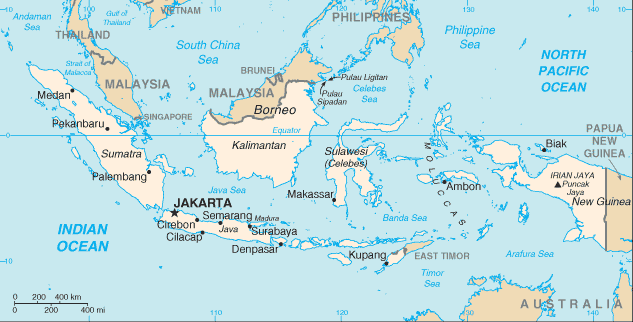Map:

Overview:
The Dutch began to colonize Indonesia in the early 17th century; the islands were occupied by Japan from 1942 to 1945. Indonesia declared its independence after Japan's surrender, but it required four years of intermittent negotiations, recurring hostilities, and UN mediation before the Netherlands agreed to relinquish its colony. Indonesia is the world's largest archipelagic state. Current issues include: alleviating widespread poverty, preventing terrorism, continuing the transition to popularly-elected governments after four decades of authoritarianism, implementing reforms of the banking sector, addressing charges of cronyism and corruption, holding the military and police accountable for human rights violations, and resolving armed separatist movements in Aceh and Papua.
The People:
Population: 241,973,879 (July 2005 est.)
Age structure:
0-14 years: 29.1% (male 35,823,456/female 34,590,631)
15-64 years: 65.7% (male 79,447,560/female 79,449,399)
65 years and over: 5.2% (male 5,526,389/female 7,136,444) (2005 est.)
Religions:
Muslim 88%, Protestant 5%, Roman Catholic 3%, Hindu 2%, Buddhist 1%, other 1% (1998)
Government Type:
republic
Leader(s) to pray for:
chief of state: President Susilo Bambang YUDHOYONO (since 20 October 2004) and Vice President Muhammad Yusuf KALLA (since 20 October 2004); note - the president is both the chief of state and head of government
Source: The World Factbook
View All Countries